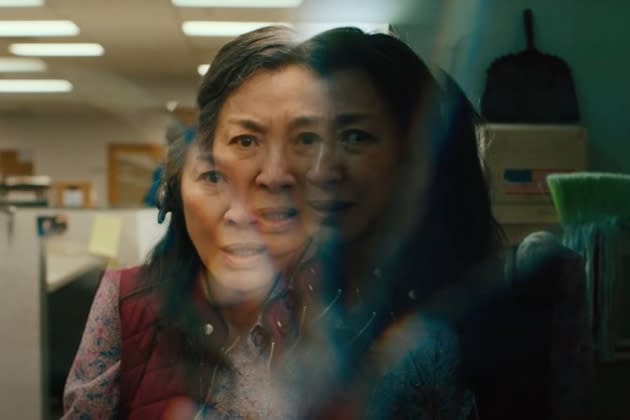Son Lux’s ‘Everything Everywhere All at Once’ Score Is Oscars’ Lone Non-Period Contender
- Oops!Something went wrong.Please try again later.
- Oops!Something went wrong.Please try again later.
- Oops!Something went wrong.Please try again later.
- Oops!Something went wrong.Please try again later.

It’s anybody’s game: this is a rare year when any of the five original-score nominees could win the Oscar. Two of the nominees are previous winners, two more are past nominees; only one is a newcomer, and it’s a three-man ensemble.
Four films are period pieces: an admired German-language war film, a character study set against the Irish civil war, an epic of late 1920s Hollywood, and a coming-of-age story for a young filmmaker in the ‘50s and ‘60s; the fifth is a wild, anarchic tale of a Chinese American family that saves the universe.
More from Variety
And the nominees are:
“All Quiet on the Western Front”
For this adaptation of the Erich Maria Remarque classic, German composer Volker Bertelmann used his great-grandmother’s turn-of-the-century harmonium, a pump organ whose carefully mic’d interior noises (“the breathing, the air, the wooden cracklings”) sounded to him like “a war machine.”
Bertelmann’s scary three-note “destruction” motive — which reminded director Edward Berger of Led Zeppelin — permeates the entire score, and his music for the naive soldier Paul was filtered to emulate the “muffled” sound he might have experienced in trenches surrounded by gunfire and explosions. This is Bertelmann’s second Oscar nomination, and his BAFTA win on Sunday may bode well for Oscar.
“Babylon”
Composer Justin Hurwitz (who won song and score Oscars for 2016’s “La La Land”) reunited with director Damien Chazelle for this three-hour Hollywood fever dream. He worked on the score for three years, writing more than two hours of music, and he’s already won the Golden Globe for it.
“It was this wild, unhinged, hedonistic world full of underground music, and I realized that we could do things that would really stretch the boundaries of what we think of as 1920s music,” he says. He took inspiration from modern house, EDM and dance music to match the energy and reckless abandon conveyed in the film.
“The Banshees of Inisherin”
Composer Carter Burwell wrote much of the score for Martin McDonagh’s film, set in 1923 Ireland, from the point of view of Colin Farrell’s character, “this child-like lad with his miniature donkey.” He assembled a small, unusual ensemble (including celeste, harp, alto and bass flute) that “had a dreamy quality, a little fairy-tale-like.”
Brendan Gleeson plays his own music on the fiddle, and McDonagh didn’t want any faux-Irish music in the score, so Burwell’s score plays the increasingly dark and disturbing story and what he calls “the mystery of Inisherin.” This is Burwell’s third nomination (after “Carol” and “Three Billboards Outside Ebbing, Missouri”).
“Everything Everywhere All at Once”
Experimental band Son Lux (Ryan Lott, Rafiq Bhatia, Ian Chang) scored the absurdist comedy-drama, making them only the eighth team of three or more composers to earn an Oscar nomination (three have won). “Are you sure you have the right band?” Lott remembers asking directors Daniel Kwan and Daniel Scheinert. “This movie sounds kinda crazy and we’re pretty serious and sad musically.”
Son Lux sampled sounds, recorded gongs and Chinese opera drums, experimented with stringed instruments, and “developed a lot of the raw sounds ourselves,” Lott said. “Almost every moment of the movie had to be completely earnest, so we were encouraged to be heart-on-the-sleeve.”
“The Fabelmans”
This is 91-year-old composer John Williams’ 29th film for Steven Spielberg, concluding a 50-year collaboration with a story drawn from Spielberg’s own youth, discovering the joys of filmmaking while his parents’ marriage is coming apart. Williams’ 53rd Oscar nomination (including five wins) is not just a record for the music categories, he is the most-nominated living person and the only one to be nominated for the Oscar in seven different decades.
“I knew and greatly admired Steven’s parents,” Williams says, “and I was always impressed by his mother, Leah’s, musical talent,” which is reflected in his evocative piano theme for the film and in the magical, deeply felt music for Mitzi’s nighttime dance in the woods. “John knew my parents well, and he wrote this score as a gift to them,” says Spielberg. Williams is now at work on the fifth “Indiana Jones” film, and has hinted that it may be his final work for the movies.
Best of Variety
Oscars Predictions: Best Actor – Austin Butler Rises After BAFTA Win for ‘Elvis’ -- Is SAG Next?
Oscars Predictions: Best Director – Are the Daniels Unstoppable?
Sign up for Variety’s Newsletter. For the latest news, follow us on Facebook, Twitter, and Instagram.
